The iFi ZEN Phono lists some impressive specs for a phono preamp sitting in the sub-$200/£200 price bracket. iFi makes the bold statement that “you will fall in love with your LPs all over again,” but with such stiff competition in the market, how does the ZEN phono measure up?
Having reviewed many affordable phono preamps here at Sound Matters, the iFi ZEN caught my attention with its many accolades and widespread acclaim across the vinyl community.
In this review, I’ll be digging into what makes this phono stage so appealing for the price, and then I’ll be comparing it to the Schiit Mani 2, another very popular option costing $50 less. I’m keen to find out what you get for your additional $50.
Aesthetically, the ZEN makes a great first impression with its smart brushed metal front panel and matt-finished top. The distinctive curved shape also sets it apart from the usual, very angular boxes that dominate the market.
The front panel is sleek and simple with its power button, sub-sonic filter switch, and clear LEDs showing the selected gain.
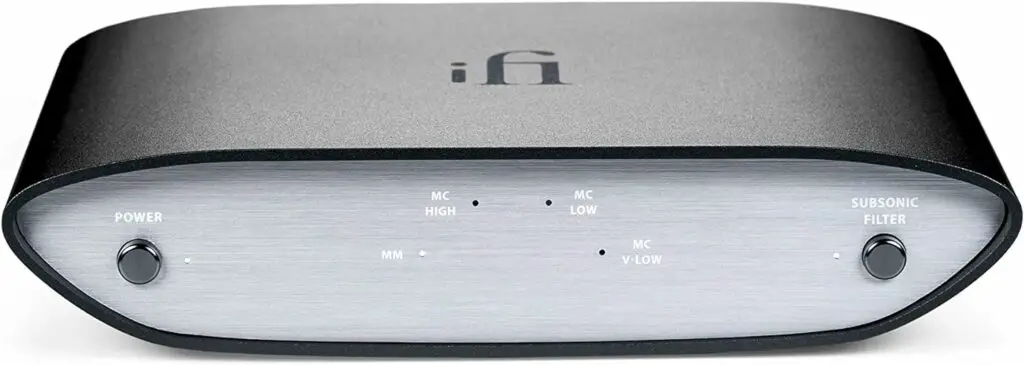
At the rear, you’ll see the usual RCA inputs and outputs, but more curiously, there is also the addition of a balanced output (a feature unheard of at this price).
Beauty and switches, however, are only skin deep, and beneath the pretty facade are some specifications that iFi are quick to shout loud and proud.

Wide Cartridge Compatibility
The ZEN is compatible with moving magnet and moving coil phono cartridges, allowing you to seamlessly switch between four gain settings ranging from 36dB-72dB depending on whether you have a standard MM cartridge, a high-output moving coil, a low-output moving coil, or a very low-output moving coil.
With such a wide gain range, the ZEN Phono is capable of handling almost any cartridge you can throw its way. There are, however, no loading controls. Instead, the ZEN favors fixed parameters and reduces the user controls to a single switch on the rear panel.
Quiet Performance
iFi also claims a very low noise floor figure of -151dBV, partly due to its power supply design.
Any phono preamp using a switching power supply (which is essentially all phono preamps at this price) require additional filtering or design strategies to remove any high-frequency noise or interference and maintain signal purity.
The iFi ZEN lists what they call their own high-tech clean power supply with complex filtering and a high-precision power supply controller, which is crucially isolated from other components on the PCB board. Keeping a component like this separate is a smart move to avoid unwanted noise bleeding into the signal chain.
Another phono preamp I recently reviewed (The Classic Audio Spartan 15) takes a very different approach here, instead favoring a traditional linear power supply for low-noise performance.
RIAA Performance
Impressively, the ZEN Phono lists an alleged precise RIAA adherence of +/- 0.15dB, which is said to be on par with models built from hand-selected capacitors. The capacitors in question are multiple high-quality TDK C0G capacitors in parallel, which the company claims minimize distortion and perform well above their pay grade.
In fact, iFi are pretty transparent about the brand of components used across the board, claiming to take influence from previous higher-end models.
As far as I can see, there is no frequency range listed for this specification, meaning I don’t know if that figure is accurate across the entire human hearing range, for example, or just a select range.
Still, if it’s anywhere close, this is an impressive figure for a sub-$200 unit.
Unique Subsonic Filter
Unlike many other subsonic filters designed to deal with rumble caused by record warps, the ZEN Phono uses a unique approach to remove rumble only without affecting bass.
According to their website, they have incorporated this technology since their high-fidelity iPHONO model. The company claims their technique works by understanding that, based on how records are cut, low-frequency vertical modulation must be warp. Therefore, they designed a filter to take advantage of this by removing rumble without attenuating bass.
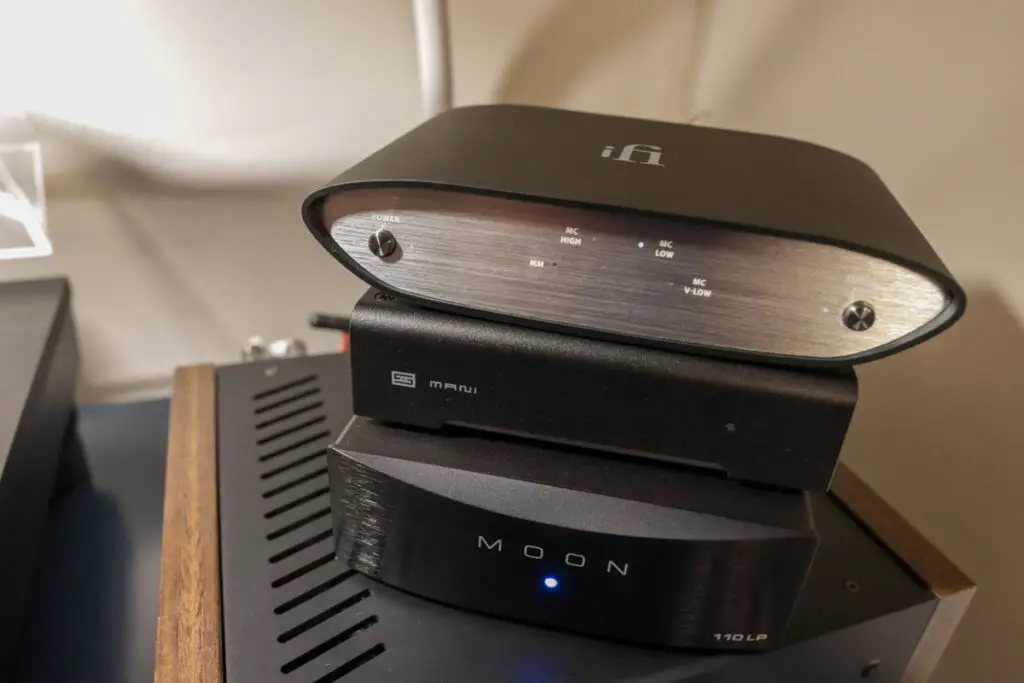
iFi ZEN Phono Listening Test
For the listening test, I compared the ZEN Phono with the Schiit Mani 2 ($150) and my Moon 110LP v2 ($599).
First impressions just listening to the noise floor were excellent; true to their word, the background “hiss” so commonly associated with phono preamps was almost non-existent unless the volume was cranked to absurd levels.
In terms of background hiss, the ZEN phono is easily quieter than both the Mani 2 and the Moon 110LP v2 (the latter of which costs a whopping $400 more).
The only other affordable phono preamp I’ve heard with a background hiss as low as this is the Classic Audio Spartan 15, priced at $450/£330.
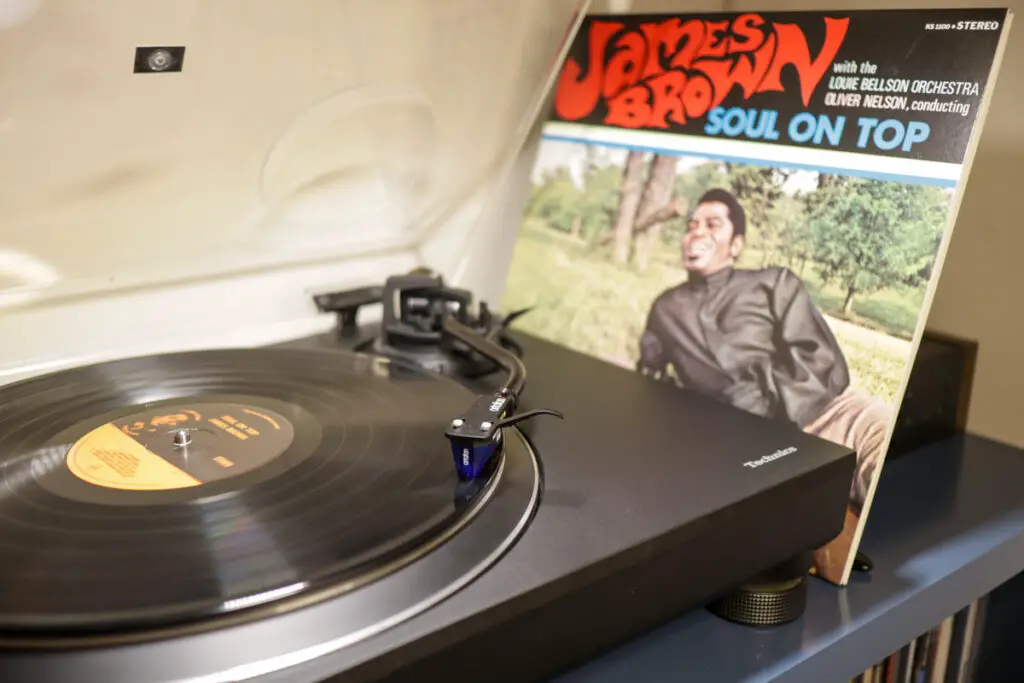
Listening to James Brown’s Soul On Top, the ZEN Phono has a slightly warm, detailed, and clean sound. Overall, I would describe the sound as fairly neutral until you get to those higher frequencies where it is a touch warmer than both the Moon 110LP and the Mani 2.
The ZEN has a really solid grip on the bass, remaining cool, calm and collected, but also solid and punchy. Instrument separation is great and there’s plenty of detail and dynamics akin to much more expensive phono stages.
iFi Zen Phono vs Schitt Mani 2
Switch over to compare with the Mani 2, the bass became much bolder, but also less clean and defined. To my ears, the top end has a little more zest, but it’s also a touch on the harsh side at time – particularly during some crescendos of Brown’s vocals and some of the instrument solos.
The Moon 110LP V2 is somewhere in the middle, definitely retaining a similar grip on the bass and instrument separation as the ZEN, only with a touch more zing up top.
Next up, I span the recent VMP reissue of Labelle’s Nightbirds, the Moon 110LP arguably sounds a touch more lively and dynamic, but I’m nontheless seriously impressed with how the ZEN Phono measures up.
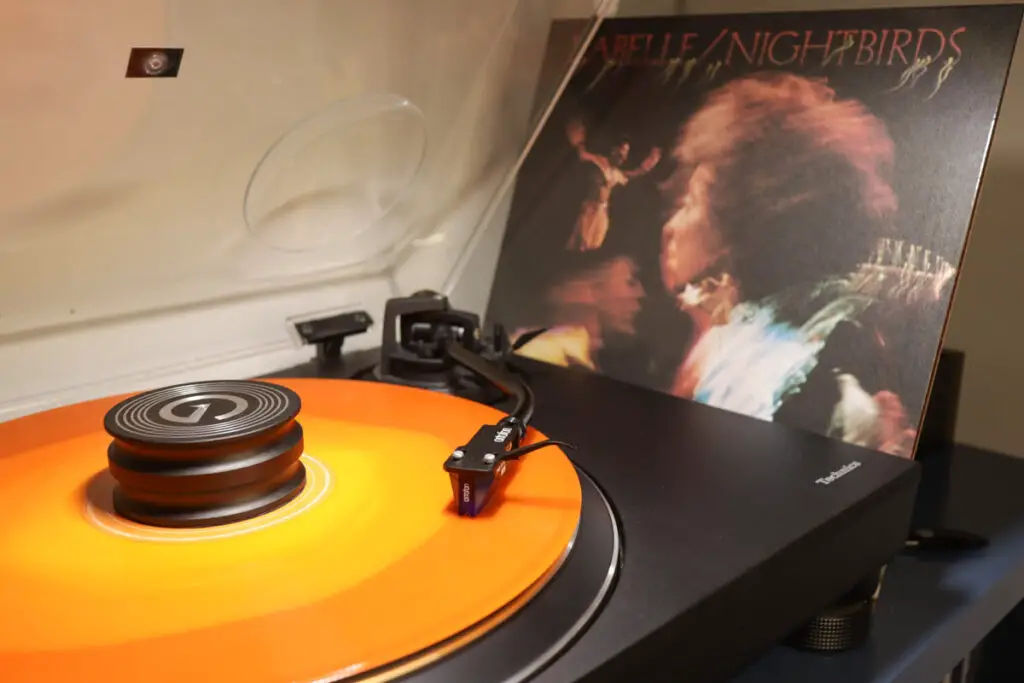
Swapping back to the Mani 2 just further confirms my suspicions about the bass clarity and overall harshness. It’s a little aggressive for my taste.
Sound quality, of course, is a very subjective and personal decision. The Mani 2 still has great dynamics and detail with a really nice wide soundstage, considering the price, but I’ve always found it doesn’t suit my Ortofon 2M Blue cartridge. To my ears, the Mani 2 benefits more from a slightly warmer-sounding cartridge, say, for example, an Audio Technica VM95E.
Moving Coil Performance
So far, the ZEN Phono is holding up well against a much more expensive phono preamp in the Moon 110LP, but what happens if we throw a moving coil cartridge into the mix?
Running an Ortofon Quintet Red I felt the Moon 110LP was the better performer here. The sound is less woolly on the low end, with clearer instrument separation in the mid-range, and warmer more natural high frequencies.
Granted, I only have one moving coil cartridge to test here, but that’s what I’m hearing during these tests.
It’s worth noting that the Moon 110LP gives you control over loading via a series of dip switches, while the ZEN Phono (as already mentioned) has fixed settings for low output and very low output moving coils, respectively.
iFi ZEN Phono Review – The Bottom Line
Considering the very reasonable price, the iFi ZEN comfortably punches above its weight, particularly when it comes to the impressive signal-to-noise ratio.
The ZEN comfortably beats anything I’ve heard to date in the sub $200 price bracket. The performance with moving magnet cartridges easily holds its own against phono stages costing over twice the price and the addition of a moving coil upgrade path and a balanced output connector makes a very easy recommendation as one of the best affordable phono preamps on the market.
My only slight niggle is the length of the supplied power cable. It’s easily the shortest power lead I’ve come across when it comes to phono preamps, and with the height of my turntable unit, I had to use an extension lead to reach a socket.
iFi sells a power supply upgrade called the iPower2, so perhaps that’s the solution, although it does raise the overall cost by $69/£69. Besides this, the ZEN Phono’s name seems reasonably apt, given the hours you could lose getting lost in the music.
VIEW PRODUCT ON AMAZON
VIEW AT TURNTABLE LAB
Further reading:
Best phono preamps at any budget

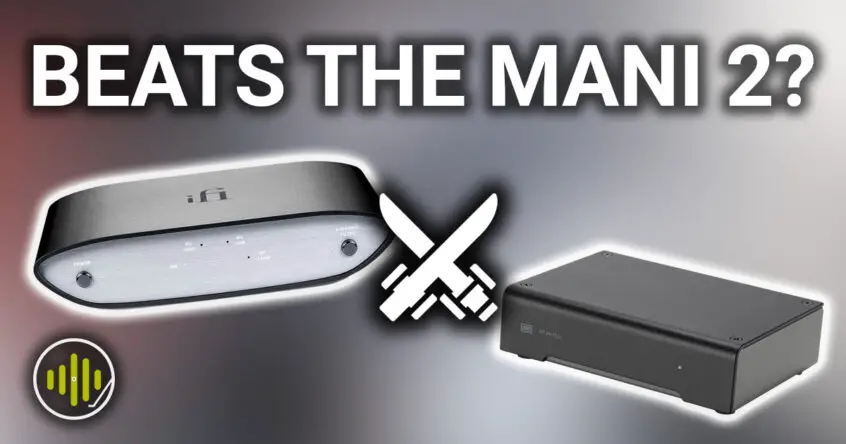


Would appreciate if I could get any inputs on the sound quality based the combination of ZEN phono with Fluance RT82 or RT85 ( both with Ortafon 2M Blue ) ?
I have an audio shootout on my Patreon page so you can hear the difference directly between the Ortofon Blue and the MP-110 if that’s of interest:
https://www.patreon.com/posts/ortofon-2mblue-103490005?utm_medium=clipboard_copy&utm_source=copyLink&utm_campaign=postshare_creator&utm_content=join_link
There’s also an audio shootout between the Zen and the Mani 2.
A good review on phonos under 200 sub bracket. 👍. ZEN is indeed a performer , isn’t it ? Wonder how would this ZEN punches if it gets paired up with Fluance RT85N ( with Nagoaka MP-110) ?
Thanks! It works really well. Funny enough, that’s exactly what I’m running in my family living space as a rig.